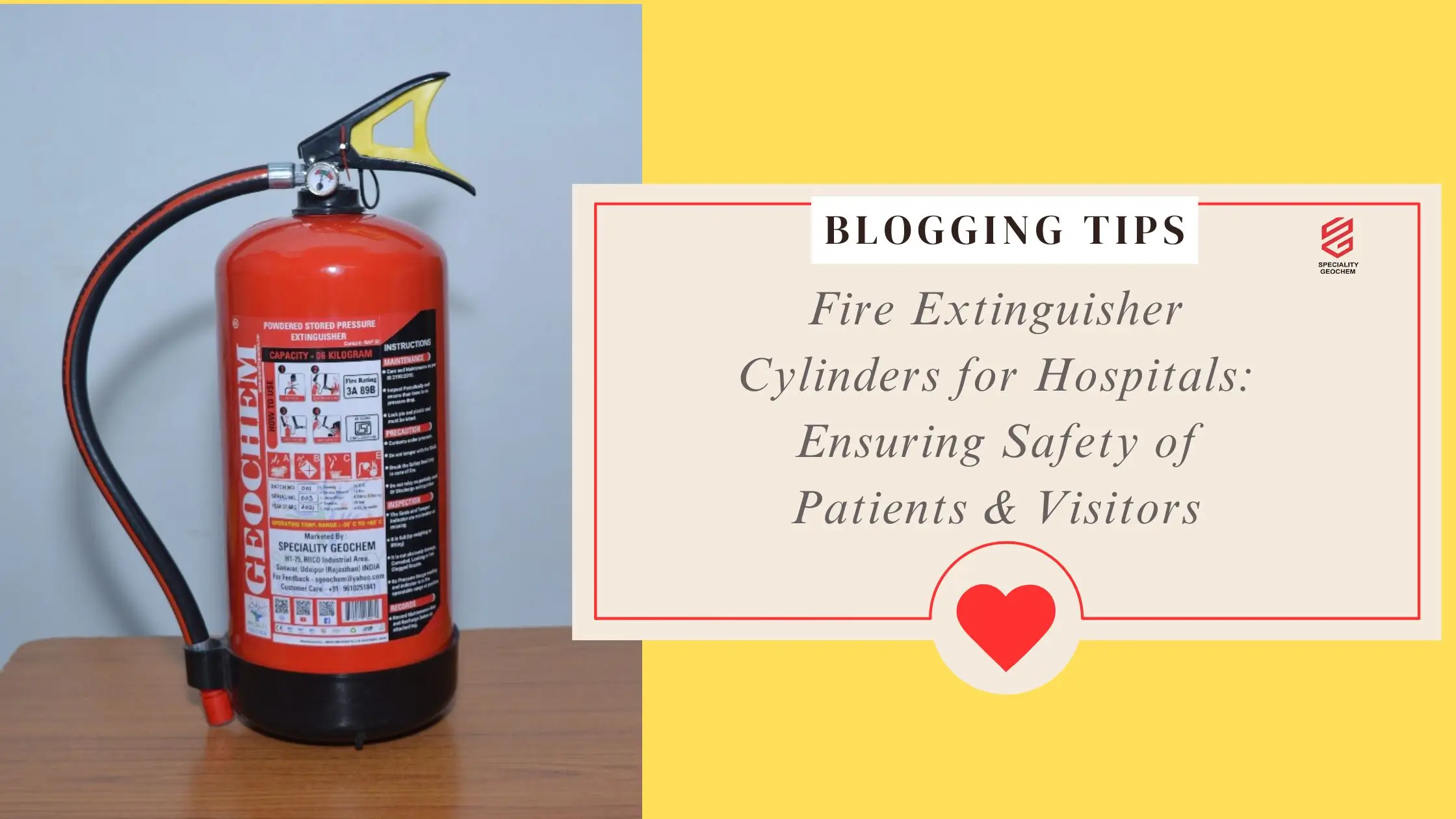Hospitals are sanctuaries of care, healing, and hope. But like any large facility with high human traffic, electrical equipment, medical gases, and flammable materials, hospitals also face the risk of fire emergencies. In such a sensitive environment, ensuring fire protection is not just a regulatory requirement—it is a moral obligation. Among the many safety measures in place, fire extinguisher cylinders for hospitals remain one of the most reliable and immediate tools to control fire outbreaks before they escalate.
This article explores why hospitals need these cylinders, the types suitable for different fire risks, their placement strategies, and the broader benefits they provide in safeguarding lives, property, and medical continuity.
The Unique Fire Risks in Hospitals
Hospitals differ significantly from offices, schools, or shopping malls when it comes to fire hazards. Some of the unique risks include:
- Medical oxygen supply: High concentrations of oxygen can accelerate fires.
- Electrical equipment: From ventilators to diagnostic machines, hospitals rely heavily on electricity.
- Laboratories: Pathology and research labs use flammable chemicals and gases.
- Kitchen areas: Hospital kitchens use LPG and oil, making them prone to Class B fires.
- Patient immobility: Unlike other buildings, evacuation in hospitals is complex as many patients cannot move quickly.
Given these challenges, fire extinguisher cylinders for hospitals are a frontline defense, capable of stopping small fires before they become catastrophic.
Why Fire Extinguisher Cylinders Are Essential in Hospitals
1. Immediate First Response
Fires spread within minutes. Trained staff can use fire extinguisher cylinders to control the flames instantly, preventing casualties and property damage.
2. Compliance with Safety Standards
National Building Code (NBC), NABH guidelines, and local fire departments mandate hospitals to install firefighting equipment, including cylinders. Compliance ensures safety and avoids penalties.
3. Protection of Critical Equipment
Hospitals house costly diagnostic machines like MRI, CT scanners, and life-support devices. Fire extinguishers protect these investments and ensure continuity of healthcare services.
4. Safeguarding Human Life
Patients, visitors, and healthcare workers depend on hospital authorities for safety. Fire extinguisher cylinders provide immediate protection until professional firefighters arrive.
Types of Fire Extinguisher Cylinders for Hospitals
Different hospital zones face different risks. Hence, it’s important to select the right type of fire extinguisher cylinder:
- Water-Based Cylinders – Effective for Class A fires (wood, paper, cloth). Ideal for general hospital corridors and offices.
- Foam Cylinders – Suitable for Class A and B fires. Recommended for hospital kitchens.
- Carbon Dioxide (CO₂) Cylinders – Effective on Class B (liquids) and Class C (electrical) fires. Best for ICU, operation theaters, and server rooms.
- Dry Chemical Powder Cylinders – Multi-purpose extinguishers for Class A, B, and C fires. Commonly installed in multiple hospital areas.
- Clean Agent Cylinders – Non-residual and safe for sensitive equipment. Suitable for diagnostic labs and data centers.
By customizing extinguishers to zones, hospitals achieve comprehensive fire safety.
Strategic Placement in Hospitals
Placement is just as important as selection. Guidelines recommend that:
- Cylinders should be installed in corridors at visible and accessible points.
- Operation theaters and ICUs must have CO₂ or clean agent cylinders nearby.
- Kitchens should be equipped with foam or powder extinguishers.
- Laboratories and chemical storage rooms should have powder and CO₂ cylinders.
- Elevators and staircases must have easily accessible extinguishers for quick use.
The general rule: No one should have to walk more than 15 meters to access a fire extinguisher cylinder in a hospital.
Training and Awareness for Hospital Staff
Even the best fire extinguisher cylinders for hospitals are ineffective without trained users. Hospitals must:
- Conduct regular fire safety drills.
- Train doctors, nurses, and support staff to use extinguishers confidently.
- Display signage and instructions in multiple languages for clarity.
- Assign fire wardens for each department.
Patient safety depends not only on the equipment but also on the readiness of hospital staff.
Maintenance of Fire Extinguisher Cylinders
Fire safety equipment must always be in working condition. Hospitals should ensure:
- Monthly inspections – Check pressure gauges, hoses, and seals.
- Annual servicing – Conducted by certified fire safety professionals.
- Hydrostatic testing – Done periodically to check cylinder integrity.
- Replacement of expired units – Cylinders typically have a 5-year lifespan.
Hospitals should maintain a logbook for audits and compliance records.
Benefits Beyond Safety
Investing in fire extinguisher cylinders for hospitals brings additional advantages:
- Reputation Management: Patients trust hospitals that prioritize safety.
- Insurance Benefits: Many insurers offer premium discounts for hospitals with robust fire protection.
- Business Continuity: Avoids downtime caused by fire incidents.
- Peace of Mind: Doctors, patients, and families feel secure in a safe environment.
Role of Speciality Geochem in Hospital Fire Safety
Speciality Geochem, a trusted manufacturer of fire safety equipment in India, offers high-quality fire extinguisher cylinders for hospitals. Built with durable materials and tested for multiple fire classes, these cylinders are designed to deliver rapid and reliable performance in critical environments. With years of expertise, Speciality Geochem ensures hospitals receive not just equipment, but complete peace of mind through innovation, compliance, and after-sales support.
Conclusion
Hospitals are unique institutions where every second matters, and fire safety cannot be compromised. A single incident of fire can endanger patients, staff, and visitors, making prevention and preparedness absolutely vital. Fire extinguisher cylinders for hospitals act as a reliable first line of defense, ensuring quick suppression of fire outbreaks before they escalate into major threats.
By choosing the right type of cylinders, placing them strategically across hospital zones, and providing regular training to medical and support staff, hospitals create a secure environment that reflects both compliance with safety regulations and genuine care for human life.
At Speciality Geochem, we are committed to delivering high-quality, durable, and efficient fire extinguisher cylinders that meet the specific safety requirements of healthcare facilities. Our solutions not only safeguard lives but also help hospitals build trust, resilience, and confidence in their ability to handle emergencies.
In the end, investing in the right fire extinguisher cylinders is not just about meeting safety norms—it is about protecting the most precious resource of all: human life.

